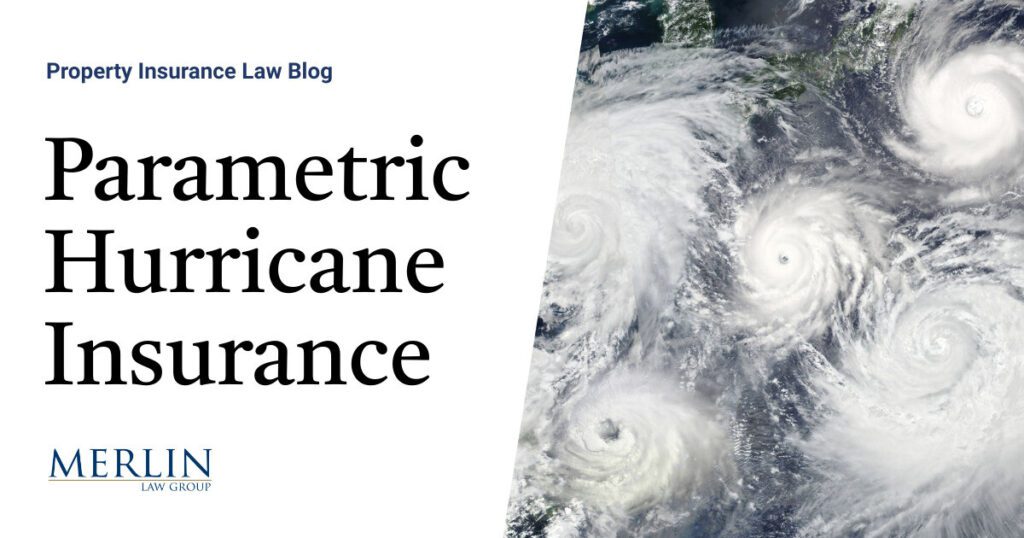Parametric Hurricane Insurance

As the traditional insurance market continues to harden, policyholders are increasingly exploring parametric hurricane insurance as a complement and sometimes a substitute to their existing property insurance coverage. This innovative insurance product offers rapid payouts based on predefined triggers, potentially providing critical liquidity when businesses need it most.
What Is Parametric Hurricane Insurance?
Unlike traditional insurance that pays based on actual damages, parametric insurance provides pre-agreed payouts when specific conditions are met, such as hurricane wind speeds reaching certain thresholds at insured locations. The key distinction is that payment is triggered by the event parameters rather than the actual loss sustained. Parametric Hurricane insurance pays a percentage of the total value based purely on the mathematics of the wind speed and distance a property is from the center of the hurricane at landfall.
A few bringing me these policies for review following Hurricanes Helene and Milton have asked me if these are legal. While some have questioned whether parametric insurance is simply gambling, the insurance industry has addressed these concerns. Most commercial parametric solutions require an insurable interest, distinguishing them from mere speculation. The policyholder must own the property where the event is triggered.
Yet, the fact the property has no discernable damage and the policies provided to me stating the terms of the policy are confidential and may not be disclosed to third parties and “especially the media,” clearly raises questions about whether the underwriters are concerned about how the public may perceive these new forms of insurance—or is it a new form of gambling?
Several reputable insurers currently offer parametric hurricane coverage in Florida:
Descartes Underwriting
Provides coverage up to $75M in annual aggregate limits
Offers customizable triggers based on wind speed data
Uses “Cat-in-a-circle” or “Wind speed at location” structures
Swiss Re Corporate Solutions
Offers their “STORM” parametric product
Uses Moody’s RMS HWind data for verification
Provides payouts within 14 days of qualifying events
Arbol
Specializes in parametric reinsurance solutions
Demonstrated success with rapid claim payments
Provided a $10M payout to Centauri Insurance after Hurricane Ian
Commercial policyholders may consider parametric coverage because the speed of payment provides almost immediate financial relief. The fact is that traditional claims payments are no longer fast. Parametric payouts are typically paid within 14-30 days of the triggering event, compared to months or even years for traditional claims.
The triggers and payouts are clearly defined upfront, eliminating disputes over damage assessments, which now takes at least months for slow-moving commercial claims to adjust or pay business interruption and extra expense monies. From this view, parametric insurance can provide immediate financial relief that the traditional product is no longer providing as claims departments recede from having general property insurance field adjusters with significant payment authority. I suggest that this insurance be supplemental to the primary but slow-paying commercial property insurance.
My research has found the effectiveness of parametric coverage following the 2022 hurricane season. Automated Petroleum, a Florida energy provider, received payments within 14 days after both Hurricane Ian and Nicole through Swiss Re’s STORM program.
While parametric insurance offers significant benefits, policyholders should understand its limitations:
Basis Risk: The payout may not match actual losses. You could receive payment when losses are minimal or receive insufficient payment when losses are severe.
Complement, Not Replacement: Parametric coverage works best as a complement to traditional insurance, not a replacement.
Cost Considerations: Premiums may be higher than traditional insurance due to the guaranteed payout structure. This insurance works purely on a mathematical basis, and the actuarial odds are certainly in the insurance company’s favor.
As Florida’s insurance market continues to face challenges, parametric hurricane insurance represents an innovative solution for commercial policyholders. The combination of rapid payouts, transparent triggers, and coverage flexibility makes it an attractive option for some businesses seeking to enhance their hurricane protection.
However, careful consideration should be given to how parametric coverage fits within the overall risk management strategy. My suggestion is that it be purchased as only a supplement to traditional insurance. The payouts can be far less than the total amount of loss sustained, leaving the policyholder having to finance the replacement. However, while it’s not a complete solution, it can provide critical cash liquidity precisely when businesses need it most.
The insurance industry is failing to provide significant prompt payments for partial loss like it used to do when I first started in this business over 40 years ago. This type of insurance seems like an expensive solution to the problem, with the only other alternative being pre-arranged lines of credit with a bank so that the insurance acts like collateral for the bank, which is really the policyholder’s insurer when disaster strikes.
Thought For The Day
If you are not willing to risk the unusual, you will have to settle for the ordinary.
—Jim Rohn



